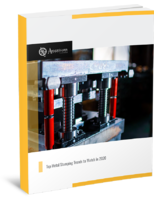IPC Releases IPC-6012EM, Medical Applications Addendum to IPC-6012E, Qualification and Performance Specification for Rigid Printed Boards
BANNOCKBURN, Ill., USA, October 1, 2020 — IPC is known for developing addendums to some of its most widely used standards for specific industry sector use, including military/aerospace, space flight, automotive and telecommunications. Now, IPC has responded to requests from the medical device segment of the electronics industry and has released IPC-6012EM, Medical Applications Addendum to IPC-6012E, Qualification and Performance Specification for Rigid Printed Boards.
The IPC D-33AM Task Group developing IPC-6012EM realized that there are two different focuses for electronics in the medical device industry sector: the relatively high-volume production of “standard-sized” printed boards for medical diagnostic equipment applications; and the miniature, high density printed boards for very small devices which are often human body implantable.
“We understand the medical industry utilizes electronics in laser surgical devices, radiation emitting devices, x-ray machines, ultrasound devices and implantables where product failure can result in the high risk of injury to the patient,” noted John Perry, IPC director of printed board standards and technology. “IPC recognized the industry’s desire for more stringent printed board fabrication requirements than can be provided within the current IPC Class 3 Performance class for these types of medical devices. The IPC D-33AM Task Group was created to develop an addendum to the base IPC-6012E printed board performance specification that addresses those technological needs.”
IPC’s family of printed board design standards (IPC-2220 series) and board performance specifications IPC-6010 series) make use of three IPC producibility levels, intended to convey to the end user an increasing cost and sophistication with respect to fabricating printed board features of smaller and smaller size. IPC-6012EM is the first addendum to an IPC specification that makes use of a new design level “D”, which was created to address the miniaturization level of medical devices. This new design level “D” goes beyond the typical feature sizes of what is typically considered “high density interconnect” (HDI) and addresses conductor width/spaces below 60 µm as well as via structures below 100 µm.
Many regulatory requirements provided by both the United States Food and Drug Administration (FDA) and the European Union (EU), help ensure the safety and security of human beings (and animals) with respect to not only human and veterinary drugs and biological products, but also electronic medical devices. Examples include the EU Medical Device Directive, EU Active Implantable Medical Devices Directive and the EU Commission Regulations. As noted by Andres Ojalill, IPC technical staff liaison to the IPC D-33AM Task Group, “IPC-6012EM has been written to streamline the production of high reliability printed boards for medical devices in accordance with regulations mentioned above so that there are no gaps between technical and regulatory requirements.”
For more information on IPC-6012EM, visit https://shop.ipc.org/IPC-6012EM-English-D.
About IPC
IPC (www.IPC.org) is a global industry association based in Bannockburn, Ill., dedicated to the competitive excellence and financial success of its 6,000 member-company sites which represent all facets of the electronics industry, including design, printed board manufacturing, electronics assembly and test. As a member-driven organization and leading source for industry standards, training, market research and public policy advocacy, IPC supports programs to meet the needs of an estimated $2 trillion global electronics industry. IPC maintains additional offices Washington, D.C.; Atlanta, Ga.; Miami, Fla.; Brussels, Belgium; Bangalore and New Delhi, India; Bangkok, Thailand; and Qingdao, Shanghai, Shenzhen, Chengdu, Suzhou and Beijing, China.
Contact:
Sandy Gentry, IPC Communications Director
+1 847-597-2871 or SandyGentry@ipc.org




